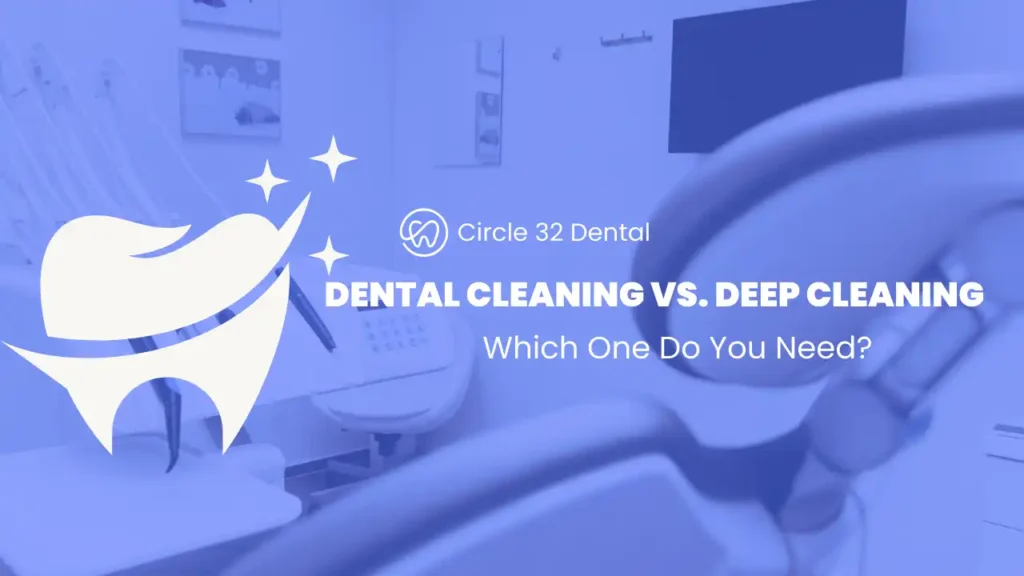Visiting someone for dental purposes does not make most folks particularly excited. If it is not a problem with a quick cleaning, the patient has a chance to know what he or she is dealing with.
See, a regular clean and a deep clean are two different things. The terms are similar but they have different ways of giving your mouth a good wash.
So, how do you know which one you need?
That is what this guide is here for. We will break it down in simple words and skip the fancy talk. Just real answers to help you understand in regular dental cleaning and deep cleaning.
What Is a Regular Dental Cleaning?
A regular dental cleaning, or prophylaxis is what most folks get every six months. Think of it as a tune-up for your teeth. Your hygienist scrapes off plaque, polishes your teeth, and checks your gums. It is pretty quick and painless.
You need to get get it because it:
- Removes plaque and tartar above the gumline
- Keeps your breath fresh
- Helps catch problems early
- Leaves your teeth smooth and shiny
If your gums are healthy and you do not have any bone loss or major plaque buildup below the gums, this is likely all you need.
What Is a Deep Cleaning?
Now, a deep cleaning also called scaling and root planing is a bit more serious. It is not just a longer version of a regular cleaning. It is for people with gum disease. We are talking about pockets of bacteria hiding under your gum line. If left alone, they can damage your teeth, gums, and even your jawbone.
What happens during a deep cleaning:
- The hygienist numbs your gums (yes, there is a needle but it is quick)
- They clean below the gumline
- They smooth out the roots of your teeth
- You might need more than one visit
This is not something everyone needs. But if your gums bleed a lot, are swollen, or pull away from your teeth, it might be time.
Why the Extra Fuss About Gums?
Your gums are more important than most people think. Healthy gums hold your teeth in place. When they are in bad shape, you can lose teeth even if the teeth themselves are fine.
Gum disease starts small. Maybe you skip flossing for a few weeks or months. Plaque builds up. Your gums get red and swollen. Then they bleed when you brush. That is called gingivitis, and it is reversible.
But if you do not treat it, it turns into periodontitis. That is when gums pull away from your teeth. Pockets form. Bacteria goes deep. And that is where a deep cleaning comes in.
Signs You Might Need a Deep Cleaning

Not sure what is going on in your mouth? Here are some clues that a basic cleaning might not cut it:
- Your gums bleed when you brush or floss
- You have bad breath that would not go away
- Your teeth feel loose
- Your gums are swollen or tender
- Your gums are pulling back from your teeth
These are signs of gum disease. A dentist will measure the depth of your gum pockets. If they are more than 4mm deep, you are in deep cleaning territory.
How Often Should You Get a Regular Cleaning?
For most people, twice a year is enough. Some folks might need more, especially if:
- They have diabetes
- They smoke
- They have had gum disease in the past
- They are pregnant (hormones can mess with gums)
A quick trip to the dentist twice a year can save you a lot of trouble and money later.
Is a Deep Cleaning Painful?
It is not exactly a spa day, but it is not terrible either. Your mouth gets numbed, so you should not feel pain. Maybe a bit of pressure or poking. Afterward, your gums might be sore and a bit swollen. That is normal. Over-the-counter pain meds help.
Most folks feel better in a day or two. Just take it easy on crunchy snacks for a while.
Cost: Regular Cleaning vs. Deep Cleaning
Let’s talk about money for a second. Dental care can get pricey, especially without insurance.
Regular cleaning:
Usually between $75–$200, depending on where you live and whether x-rays are included.
Deep cleaning:
Often billed per quadrant (top left, bottom left, etc.). Each can run $100–$400. So a full mouth might cost $400–$1600 or more.
Insurance often covers both but they might require proof of gum disease before covering a deep clean. Always check first.
Is One Better Than the Other?
It is not really a “better or worse” thing. It is about what your mouth needs.
If your gums are healthy, a deep cleaning is overkill. But if you have got signs of gum disease, a regular cleaning just won’t fix the problem.
Here’s a quick cheat sheet:
| Situation | What You Likely Need |
| Healthy gums | Regular cleaning |
| Slight bleeding when brushing | Possibly regular cleaning, with better flossing habits |
| Pockets deeper than 4mm | Deep cleaning |
| Loose teeth or gum recession | Deep cleaning |
| Haven’t seen a dentist in years | Start with a checkup, they will tell you what is needed |
What Happens After a Deep Cleaning?
You would not be in and out in five minutes, but deep cleaning does a lot of good. Once you get a deep cleaning:
- Gums start to heal
- Pockets shrink
- Bad breath improves
- You stop bleeding when brushing
You will need follow-ups to check on progress. In some cases, dentists suggest more cleanings every 3–4 months instead of every 6.
You will also have to step up your game at home:
- Brush twice a day
- Floss daily
- Use an antibacterial mouthwash if your dentist recommends it
Can a Deep Cleaning Cure Gum Disease?
The answer to this question is no, but it can stop it from getting worse.
Deep cleaning helps your gums heal. It removes the nasty bacteria under the gums and gives your mouth a fresh start. But if you go back to skipping floss or avoiding checkups, it will all come back. Fast.
It is kind of like clearing out weeds in a garden. If you do not keep up with care, they return.
What If You Avoid the Dentist?
We get it. Life’s busy. Or maybe you’re nervous. But ignoring gum disease would not make it disappear.
Without treatment:
- Gums get worse
- Teeth loosen
- You may lose teeth
- Infections can spread
- Your overall health might suffer
Yes, your mouth is directly connected to the rest of your body. Gum disease has been linked to heart disease, and diabetes. So, it is not just about your smile.
Deep Cleaning and Mental Health
Let’s talk about real life. Dental anxiety is common. You are not alone. The thought of someone poking around your gums is not fun. And deep cleanings sound scary.
But here is the thing many folks feel relieved after it is done. Their mouth feels fresher. Their gums are not bleeding anymore. And they can smile without feeling self-conscious.
If nerves are getting in your way, tell your dentist. They deal with this all the time. You can even ask for a stress ball or headphones. Some places offer sedation, too.
Dental Cleaning Or Regular Cleaning Which Is Best For You?
Still unsure? That is okay. Here is a simple way that help you find the right one for you:
- If your gums are fine and it has been 6 months: Go for a regular cleaning.
- If your gums bleed, hurt, or feel off: Schedule a checkup. You might need a deep cleaning.
- If it has been years since your last visit: Do not panic. Just go. The dentist would not judge.
The earlier you catch gum problems, the easier and cheaper they are to fix.
Final Words- Dental Cleaning vs. Deep Cleaning
Your teeth do not need to be perfect. But your gums? They do need care. Regular cleaning keeps things in check. Deep cleaning tackles bigger problems.
Both are important, but for different reasons. So do not guess. If you are unsure, book a dental checkup. It is better to know than to wait. A healthy mouth is about more than clean teeth. It is about feeling good, eating without pain, and smiling without worry.
FAQs – Dental Cleaning vs. Deep Cleaning
Is deep cleaning the same as a root canal?
No, root canals deal with tooth roots and infections inside the tooth. Deep cleanings focus on gum health.
Can I go back to regular cleanings after a deep clean?
Yes, but only if your gums stay healthy. Some folks need more frequent visits.
Can deep cleaning damage my teeth?
Not when done right. It helps save your teeth by stopping gum disease. What if I do not feel pain, do I still need a deep clean?
Maybe. Gum disease does not always hurt. That is why checkups matter.
Read More : Why Regular Dental Cleanings Are Essential for Your Oral Health?
Read More : What Is a Dental Cleaning? Everything Austin Residents Need to Know

